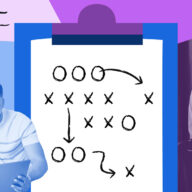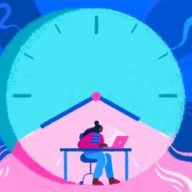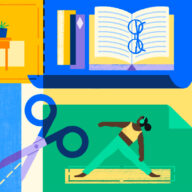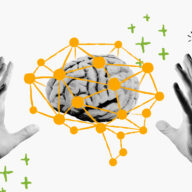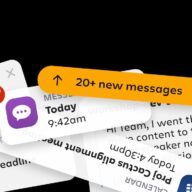In March of 2020, as Will Smith is filming the biopic “King Richard,” the emergence of COVID-19 abruptly shuts down all production. With unusual downtime and an urge to uplift his audience amid looming uncertainty, the actor meets with his production team at Westbrook Media to find a creative solution. What if they created a variety show with Will as the host – from his house?
Smith had never hosted a variety show, and Westbrook Media had never done anything like it – not to mention during a pandemic, where the full production crew can’t be on set, and those on location must follow strict safety protocols. But they take on the challenge, and in only a few weeks Snapchat offers a lucrative deal to launch the show as soon as possible. In the final episode of season 3, host Gabriela Cowperthwaite tells the story of the making of what became the hit Snapchat show: “Will From Home.” A show developed in an entirely new way, where Will Smith’s garage becomes the set and the people he interviews aren’t with him but in their own homes and garages. Behind the scenes, it’s the amazing work of a team of enterprising producers, writers, editors, and leaders who discovered during the making that many age-old industry practices need to be more inclusive and collaborative – even after the pandemic. Throughout the episode, Gabriela, a film director herself, shares her experiences of working in film production during this time and offers insights on teamwork lessons that are here to stay. You’ll hear from Gila Jones, COO of Westbrook Media, and Lukas Kaiser SVP and Head of Content. You’ll also hear from Dawn Manning, Head of Physical Production, Ashley McCollum, SVP, Revenue & Strategy and Dana Z. Currier SVP, Operations.
Transcript
It’s mid-March, 2020, and we’re on the set of King Richard. No, it’s not another Shakespeare movie, but it is epic: King Richard is the story of Richard Williams, father of tennis super stars Venus and Serena. The role of Richard is being played by Will Smith. The crew has been at work for about two months and there’s still a lot of shooting to do. But seemingly out of nowhere comes a worldwide pandemic, threatening to shut down production.
Lukas Kaiser:
And Will’s movie is still kind of going, it’s still kind of going and then suddenly everything shuts down.
As you probably remember, everything means everything. It’s not just that Will Smith can’t work on his film, he can’t leave his house. And that’s a major problem for his production company, Westbrook. They were just created in 2019, and their media wing’s existence is reliant on promoting Will’s films via social media. No films means no promotion. They’re facing a complete shut down, which could be a death knell for the young company. But instead, his team realises this is an opportunity for a new kind of project and a new working approach to get there.
Ashley McCollum:
And all of a sudden, he’s available. He was supposed to be on a movie set for several months. And he’s available. And our team was able to talk to him and say, what do you want to do? What do you want to make of this time? It’s a really tough time out there. People are struggling. And people need a sense of escapism.
Lukas Kaiser:
We kept hearing work from home, work from home and then there was a lot of people calling things “at home” like ‘Jimmy At Home’ or ‘This Is At Home’ but we just liked ‘Will From Home’, WFH, we thought it was a great hashtag. Will From Home, Work From Home. We leaned in that direction
From out of nothing, Will’s team comes up with the idea of creating a brand new, short-form variety show. Something Will has never done. And not just in quarantine, but because of quarantine. In next to no time they’ve signed a deal with Snapchat to provide a series of episodes, like, tomorrow.
Dana Currier:
The concept of Will From Home kicked up so quickly, and it was so consuming that I don’t even think we had a chance to think like, “Oh, crap, now what happens to the business?” Because we just had work to do, and we had this is now juggernaut of a deal that we had to get done so quickly. And speed was the name of the game, because Snap was really adamant about wanting to make it happen quickly, because they’re like, “We don’t know when this is going to end, so we want to make sure we capitalize on this time.
But it’s not just that Will had never hosted his own show before. His team had never made content like this. On an incredibly tight schedule. And, oh yeah, while a pandemic was raging around them.
CLIP https://youtu.be/LPBfT1nxkYk
0:15-0:27
“I’m gonna do a show from out here called ‘Will From Home’…The Fresh Prince of Loneliness…The Fresh Prince of No Fresh Air…that sucks, ‘Will From Home’ is better… Will From Home.”
Could they pull it off? Could the team at Westbrook Media pivot in time to keep the company alive? Could they do it all while also adapting to the changes in production COVID restrictions required? And the biggest question — would anyone watch?
I’m Gabriela Cowperthwaite and this is Teamistry — an original podcast from Atlassian, makers of teamwork software like Jira, Confluence and Trello. This show is all about the chemistry of teams – and how some teams can change entire organizations and even whole industries with new ideas and unconventional ways of working.
______________________
Before we get to the story of Will From Home, I wanted to share an experience I had earlier this year. As you might know, I’m a film director and in February, I was shooting a new movie, I.S.S. tentatively titled, which, you guessed it, is set on the International Space Station. This means lots of green screens – working inside sound stages all day long – all while masked and distanced.
The thing is, despite all the equipment and technology, filmmaking needs a human touch. You have to be close to people, you have to communicate. You have to share and feel each other’s emotions. And that’s especially true for me, as the director. I might be trying to get something specific from my actor and because of our COVID protocols, they literally can’t see my face or can’t hear me clearly enough to understand what I’m after. Not to mention, we had a few actors who spoke English as their second language. It was a constant struggle.
Leanne Jackson
I feel like one of the biggest challenges I’ve had is just communication.
That’s Leanne Jackson and she worked with me on the movie as script supervisor.
Leanne Jackson
It’s really hard to say things quietly to someone because they can’t hear through your mask and or they want to see your lips. And even yelling out what’ll go was on the slate for the camera guys. They can’t always hear me and because of the barriers of face shield and mask and everything.
I think Leanne’s right, it felt like there was always a barrier between us that we had to fight to overcome.
I’ll admit that a few times I was so intent on communicating something that I pulled aside my face shield for a second. And I got in serious trouble with our COVID safety team. It ended up being a lesson in communication for me. I like explaining things and communicating things with nuance very specifically. But on set, I had to distill my thoughts down to the bare essentials. And that’s a skill I’m glad to have in my toolbox. Although I will be so happy to not have to wear masks anymore.
Another big change to how I usually work was schedule. Typically a film production involves 12 hour days, but because of COVID we were on what the industry calls “French hours,” or what most people call a regular workday. Not only was it great because some of my crew members were able to go home and see their families every evening, but without a long lunch break in the middle of the day, there wasn’t that long ramp up time to get back into gear. You’d sort of stay in the zone all day long with a strong sense of momentum. Not everybody loves that. I do love it. And as Leanne points out, for her, this was also an upside
Leanne Jackson
I feel like the biggest pro is that I feel like it’s shown that you can be productive in a shorter amount of time and not run your crew to the ground to get the job done.
Getting a lot done in a short amount of time, and having to change your approach to communication, is definitely what Will From Home is all about, so let’s get to that story.
As Will Smith was filming King Richard, the multimedia company he had set up in 2019, Westbrook, was already thinking about the possible impact of a coming pandemic on the entertainment industry. As a fledgling company, they knew that any major disruption could threaten their existence. So they looked to China for inspiration, a country that was offering a preview to the rest of the world of what “work from home” might look like. And specifically, how entertainment content might change. It could provide inspiration for how Westbrook Media could keep creating content during so much uncertainty. And what they’d need to prioritise to achieve their goals. Lukas Kaiser is Westbrook Media’s senior vice president of content.
Lukas Kaiser:
We had three months of being ahead of the curve on being able to track what China had been doing during their stay at-home order. Three months of amazing creativity from at-home cooking competitions to at-home fashion shows to at-home conversations and chats and all that stuff. We had been just gestating a lot of that.
So when film production shut down because of stay at home orders and Will finally had an opening in his usually hectic schedule, the idea for Will From Home came to life immediately. But there were so, so many things to figure out.
Lukas Kaiser:
No one knew the spread, no one knew what was going… There wasn’t ready testing at that very beginning moment so what we chose to do is we were scouting a location on the property that was disconnected from Will’s home itself. And what we found was he had forgotten about this garage room that for some reason he had also converted into a fun like practice put put golfing room
They had an idea and they had a space. They also had a partner. The folks at Snapchat were just starting to develop their own lineup of original short content. And they had shown early interest in working with Westbrook. So the team got a pitch together on March 17th, as soon as the lockdown began. Snapchat loved it. But they weren’t sure how long the lockdown would last – remember that feeling? – so they wanted this new show in 10 days. This was a gamble for both Snapchat and Westbrook. Could something compelling, in the moment, fun yet sensitive to the anxiety around Covid be produced this quickly? The Westbrook team kicked into high gear.
Dawn Manning:
The same weekend that we shut down, we got into writing right away.
Dawn Manning is the head of physical production at Westbrook.
Dawn Manning:
It was probably the fastest turnaround that we’ve ever done with anything. But it was like, “Okay, he’s going to be home. Let’s do it.” We put cameras in his house. We did everything before the major shutdown. We outfitted the house with remote cameras. We set up cameras for zooming.
Dawn’s team had to figure out how to make this series with as little physical contact between people as possible.
Dawn Manning:
We had our core production team which was the ones that were in the bubble which was like two cameras and a sound guy and a producer. So it was a really small team on the ground, and then I had coordinators outside that weren’t there like myself. I was on Zoom and my coordinators are on Zoom. Production managers were on Zoom. It was super different. It was hard because I’m used to being on set. I’m used to being, or at least having a representative of my team on set. So it was a pretty big learning curve to begin, to start. But we adapted really quickly.
A week after the deal was signed with Snapchat, shooting began on the first episode of Will From Home. Gila Jones is the chief operating officer at Westbrook. And yes, while the team was able to adapt, they were also working in unknown and dangerous conditions.
Gila Jones:
Everyone I think had a degree of fear in every aspect of their life. Just going to the grocery store, seeing family, maybe, maybe not, right? There were very few decisions and actions that anybody could take at that period of time, and this is March, April of 2020, that didn’t have some element of fear.
Doing a film production during that time was putting the Westbrook production team in the crosshairs of COVID. On top of everything else – sound, light, cameras – a new layer of work was needed.
Gila Jones:
We actually at that time started building out our COVID protocols, and ultimately through the production of that show created a whole COVID team, which enabled us to continue to expand production in a time where production was proving to be very challenging for most people in the industry.
But that wasn’t the only change that this situation forced on to the film industry. Because everything was being done remotely there was a lot of uploading and downloading of source files. It meant they had to shoot in lower resolution for faster file sharing. Content vice president Lukas Kaiser explains how this change started to impact their thinking.
Lukas Kaiser:
It forced us to strip away some of our excesses and focus on speed and quality of conversation and quality of content. It was great. When you’re looking for that fast, flash creativity, you want to set up systems that allow for limitations to prosper versus setting up systems that allow for too many choices. You’re going to cut out a lot of the analysis paralysis that people get.
This frantic shooting schedule, this need for nimbleness, was also going to require a new team approach. During normal shoots, many of the separate production teams – producers, operations, crew and so on – would barely interact with each other. The pandemic changed all that, as Gila Jones explains.
Gila Jones:
Through the process of producing in COVID, operations teams at the corporate level that traditionally don’t interact in a very intensive way with production did become a lot more integrated. We would have to work together and all of the different groups would need to be successful and each of the different groups would need to be able to what they could do that’s consistent with their individual group models, but do those things in a way that would support the other divisions. And so, our team, and that’s where team, capital T comes into play.
This happened at Westbrook Media by having as many touch points between teams as possible, like Slack channels, cross functional zooms and even good ol’ fashioned three way phone calls. After using these methods to break down silos between teams, Gila says people at the company achieved a kind of instinctive hyper awareness of who to tag into conversations that cut across divisions. Gila really saw the value in breaking down the walls between the different teams.
Gila Jones:
And so, that really opened up a lot more intersection of different groups within the company. I just remember being on the phone talking to people that I probably wouldn’t have in the pre-COVID times, working through issues to make sure that they can continue to do what they need to do. And from a production perspective, deliver the content, deliver on the vision of the material as set forth by the creative executives, but also do so in a really safe way and make sure people feel comfortable being on sets or otherwise having any kind of interaction with each other outside of their homes.
Dana Currier is the senior vice president of operations for Westbrook Media. Which means she oversees a lot of the teams Gila is talking about. She witnessed this teamwork approach evolve quickly during this process, in which groups found support from unlikely sources.
Dana Currier:
It’s not necessarily the most obvious use of teamwork, but sometimes our post team just really feels the pressure, or that they’re not getting what they need, and it’s not maybe our creative producers, but it’s actually our partner management team that’s there to kind of just facilitate whatever holes they have, or whatever needs they are… Or even kind of bridge some gaps that they’re having. I think that help can come from a lot of different areas, as opposed to the most obvious
This new way of working as an integrated team instead of separate, siloed ones, allowed Westbrook to launch Will From Home on Snapchat on April 3rd, just two weeks after coming up with the idea.
Gila Jones:
My favorite clip or scene from the show is actually the intro in the first episode where it’s basically the setup of how Will has come into the project and using this time kind of being sequestered in his garage to have some really fun, interesting, long overdue conversations with people that might be of interest, right? And then, he sits down at … his piano. And he starts playing, I think it’s Fur Elise. I actually didn’t know he played the piano. So, that was delightful. And then, the music just sort of, the bass like drops in, and it is such a good intro that I think the first time I saw it, I felt a tremendous sense of relief. Like, “Okay. We still have the magic. We know how to create, and we’re going to be okay.”
The team may have gotten things off the ground successfully, but the process was going to tax them in ways they weren’t even aware of yet.
Ashley McCollum:
It was a new muscle for Will Smith to use. He had not hosted an at home variety show before. So he was getting comfortable with that idea. So yeah, the project as a whole was just full of unknowns.
That’s Ashley McCollum. She runs business development for Westbrook Media.
Ashley McCollum:
Well there was an incredible amount of pressure for the team to be able to pull this off. We were having to learn how to produce remotely in some cases. So for example, Tyra Banks… we couldn’t fly her to LA for the shoot. We had to teach her how to use Zoom…and we also had to make it look good. And we had to figure out how to capture the audio and the video and a really effective way on Zoom.
In this first full length episode of Will From Home, Will and Tyra Banks talk about, and watch, the first time they ever worked together, on the set of The Fresh Prince of Belair.
CLIP https://www.youtube.com/watch?v=29hnsrewUBQ
0:06-0:18/0:22-0:31 (scene and “was that your first times acting? / my first time acting ever!”)
This was another first: the first time the Westbrook production team tried to create a seamless experience for the viewer – not to mention for Will and Tyra – over zoom and without being in the same room. They did this by shifting their approach from a traditional planned shoot, with storyboards and shot lists, to being more documentary-style. So a small, nimble crew prepared to capture anything that happened on the fly. For Lukas, this experience provided a really valuable lesson.
Lukas Kaiser:
When you’re on a Zoom with them and they’re in their home and they’re talking to you and then they’re growing their beard in or whatever, it cuts away all that pretense. People are able to see celebrities and talent and whatever in a different light because they’re just chilling in their house… It’s such a revealing facet of life and I started to call it premium intimacy. Because I was thinking about how our shows weren’t premium cinematic quality because we were talking about Zooms or whatever but you’re seeing Tyra Banks’s mom walk through the frame in the middle of our interview.
CLIP https://www.youtube.com/watch?v=29hnsrewUBQ
0:46-0:59 (“momma, be quiet!…and she telling me to shut up”)
Lukas Kaiser:
And I was like, “I love that.” To me that’s just as premium as using an anamorphic lens that Michael Bay shot Transformers on or whatever.
Watching that episode, even though Will and Tyra are talking on zoom, their chat is so natural, so fun, almost like they’re together in person. But that magic didn’t just happen. It was the result of a number of teams collaborating furiously in the background. Producers, writers, camera crew, operations, even the COVID safety team. A new type of teamwork for Westbrook that valued “good” over “perfect” by being faster, more nimble, by allowing smaller teams to engage with each other and take initiative.
CLIP https://www.youtube.com/watch?v=29hnsrewUBQ
0:31-0:45 (“Cause I had an acting agent…mm mm she from Philly”)
Something that a lot of us shared with Will and Tyra, because of all the time we spent on Zoom, was getting to know way more about each other than we had before, as production head Dawn Manning explains.
Dawn Manning:
I would say before the pandemic, as far as I would say our core office team, I would say that, I didn’t have a view into their life, their worlds unless I was super close with that person. But I can literally tell you the name of my accountant’s cat. So, you start to like really know people and get to know them on a different level which I feel like before the pandemic I wouldn’t know these things. I wouldn’t know people what they collected, that somebody was into plants. I wouldn’t know these things if it wasn’t the pandemic. So, I felt like that brought us closer.
This was a special feeling for Dawn and the whole team at Westbrook. Now, the people “behind the scenes” weren’t just invested in the show, but also in each other. This closeness—and literally seeing their teammates juggle life and work—fuelled conversations that aren’t typical in showbiz. Like – mental health, and the importance of self-care.
The leadership at Westbrook introduced a policy where for two hours each day, the production crew could stay out of meetings and instead eat lunch, or simply catch up on other important work. These were small tweaks that paid big dividends for the emotional and psychological health of the team.
TRANSITION
As they headed into the final episode of the season, the whole team would have to rely on everything they had learned because it was going to be the most challenging yet. They would have to harness their speed and nimbleness, their new lack of micromanagement, with individual teams making decisions on the fly, their focus on emotional content instead of technically high quality content. Because this final episode would be a powerfully emotional reunion for Will, returning him to one of the most important projects of his career.
Clip: https://youtu.be/ohnxdc6zT9g
0:00-0:09 “Yo, what’s up y’all, today on Will From Home, I’m hyped I’m hyped, y’all gonna love this one, I’m not even gonna rap about it. Watch this…”
Lukas Kaiser:
I think a moment on Will From Home that typifies the it takes a village to raise a show, the idea, I think would be the Fresh Prince reunion that we did
Yes, 30 years after The Fresh Prince of Belair first debuted, the show that catapulted Will Smith into stardom, the Westbrook team was going to try to reunite the cast, many of whom hadn’t spoken in years. This was going to require a new level of teamwork, because dealing with a number of guests at a distance, all interacting at the same time, could mean that some information would fall through the cracks. Over communication was essential, so that everyone would know what was expected of them, while also giving them autonomy to do their jobs.
Lukas and Ashley will tell the story of this ambitious episode.
Clip: https://youtu.be/ohnxdc6zT9g
0:30-0:35 “oh my people! Hi Jeff! Snazz! He’s Alive”
Ashley McCollum:
And what we realized was we needed multiple AEs, assistant editors also on the Zoom with their camera off, capturing full screen video of the person talking.
Lukas Kaiser:
Every single person had a pinned angle that was with a different screen recorder. Essentially, we have eight camera people working remotely at that point, right? And then if that’s the case that means that there’s eight people who are communicating with the people on the other side and hey, you’re actually framed incorrectly for da da da… So there’s all that going on number one.
CLIP: https://www.youtube.com/watch?v=ohnxdc6zT9g
0:37 – 0:53 “Jeff, you had us all scared…it’s not new (laughing)”
Lukas Kaiser:
Number two, we have two producers that are in the Zoom who are hidden but need to show clips whenever they’re ready. On top of that we have an in ear comms with Will, with our director and then the director and a comedian are also on set for that day. And so they’re giving Will joke ideas and they’re also giving Will directions on how to keep the show moving and moving forward. That comedian is communicating with the writer’s room. So he goes outside and he sits at a table and he’s on a Zoom where he’s talking to eight people who are coming up with jokes as different issues come up and he’d say, ‘Hey, guys.” There’s a text chain going on as well. There was a group that took like what? 30, 40 people to make that episode happen.
Clip: https://youtu.be/ohnxdc6zT9g
11:03-11:31 “Well thank you all…the best times in my life will have been on that set.”
TRANSITION
Will From Home was a massive success, both proving what Westbrook was capable of on such a tight timeline and with such massive restrictions, but also in terms of the kind of content people were craving. Snapchat immediately asked for a second season. Combined, the two seasons have had almost 40 million viewers.
This has earned Westbrook Media a reputation in the industry for quickly produced, short content with big impact. For instance, they turned that Fresh Prince reunion into a full blown reunion special that aired on HBO Max. They’ve done a dozen other projects since last March, like a YouTube Alicia Keys docuseries and other Snapchat series, including one with Ryan Reynolds, where the Deadpool star uses his pandemic down time to learn wild new skills, like axe throwing, latte art and ice sculpting.
CLIP
https://www.youtube.com/watch?v=4chWNyrg-Z4
0:00-0:08
All of this has completely transformed the way Westbrook works. And that starts, for Ashley and Lukas, with breaking down hierarchy.
Ashley McCollum:
What COVID kind of taught me was teams felt more fluid. It almost felt like very flat as an organization. I mean, literally, when you look at Zoom, the boxes are all the same size. Right? So everyone has the same seat at the table. It’s not like a traditional boardroom. I mean, there is an inherent flattening of hierarchy that comes with these video conferences. And that, frankly, should kick some of the ego out of the way we think about teams. And I think that’s probably ultimately for the better.
Lukas Kaiser:
The pandemic has totally completely shifted my perspective of teams. I think that I had a very traditional like captaining the ship perspective before when you’re in person, when you’re onset, when people are with you it’s there’s a director and then they have their ads and it’s almost like… Will has this old expression cause his father was a drill instructor and he used to say, “Who’s in charge? You or me? Because if there’s two people in charge everybody dies.” The whole thing like that’s the idea in the military it’s a cascading of order. And I think what technology can do can allow for a harmonious horizontal organization of teams. Meaning that everyone has a unified… There are teams and there’s team leaders and they work together for a common goal and it’s not… Everybody reports into the showrunner. The post-production team has their marching orders, the camera team has their marching orders, the writing team has their marching orders. And when we’re all working towards a common goal, it’s not about whose way is the right way or whatever it’s just that we all as long as we can use visibility to talk about our common and shared problems and also common and shared values and visions that we’re heading towards, I don’t know if we really need to have that ego of one person is cascading at the front of the pack.
Filming during the pandemic has also changed common hiring practices. Practices that needed to change. Like building teams for productions based on who you know, who you’ve worked with before. They’re onboarded fast and just as fast, they’re out the door when production is finished. These old habits, that are part of the legacy of filmmaking, really stood out across the industry and at Westbrook. Since every single team member, especially the crew on location, had to be supported with health guidelines, safety protocols, and lots of paperwork, their presence on the set had to be justified, each day. Also, the necessary lack of micromanaging meant more trust had to be put into these folks as they took on new roles. So employees were no longer just “headcounts.” This process gave Gila and the leadership a chance to make better decisions about who joined the team.
Gila Jones:
So it really opened up a whole conversation within our organization about, how do we create production teams in a way that still addresses the unique circumstances, the unique challenges of making content?… but also do it in a way … that has a lot to do with diversity and making sure that we are creating opportunities for people who want to break into this business that they otherwise might not have, making sure that people who should stay within the ecosystem are given opportunities to do so, and that it isn’t just a game of who you know. And that is something that the entire industry is beginning to grapple with.
And thanks to Westbrook media’s success – revenue is up more than 300 percent and their team has doubled in size.
The pandemic changed more than just the way content is created at Westbrook, of course. It has changed countless other productions – I mean, it certainly helped me optimize my communication and prep skills. But it’s also brought together what used to be separate worlds: premium, big budget storytelling and fast, social media engagement. Here’s Ashley again.
Ashley McCollum:
I mean, that COVID had taught us that people were watching TikToks on their phone that were not particularly premium or high quality. And they were watching you know Handmaid’s Tale on their TVs on Hulu at the same time, which was incredibly premium and high quality, and that people could handle both. And this idea of there’s one premium, there’s one audience or another audience, that kind of went away. And so I think that we were more open to it fast twitch model we call it Fast Lane IP, which we abbreviate as FLIP. And I think that Hollywood was more ready for that than we knew before the pandemic. I mean, a huge amount of change has happened in Hollywood as a result of the production shifts that happened during the pandemic. And I think these were changes that were coming for decades, and were really sped up as a result of the pandemic.
I agree. I think there will be more of this fast, shareable, social content. Which I love. And that you can have a range of technical quality but still deliver quality entertainment. That said, for myself, I also love big, immersive experiences. And the slow, careful craft of creating something special. Hopefully we can continue to have both.












